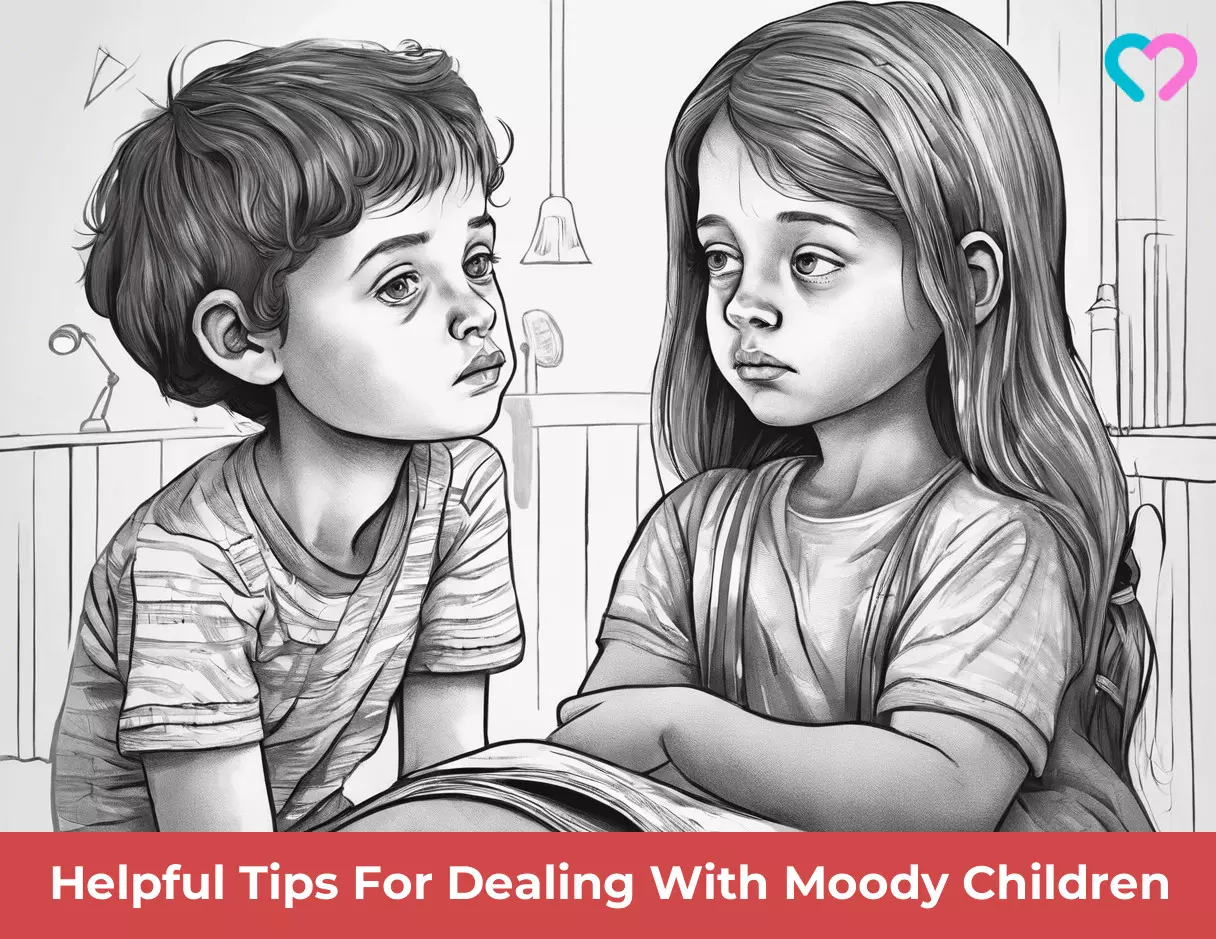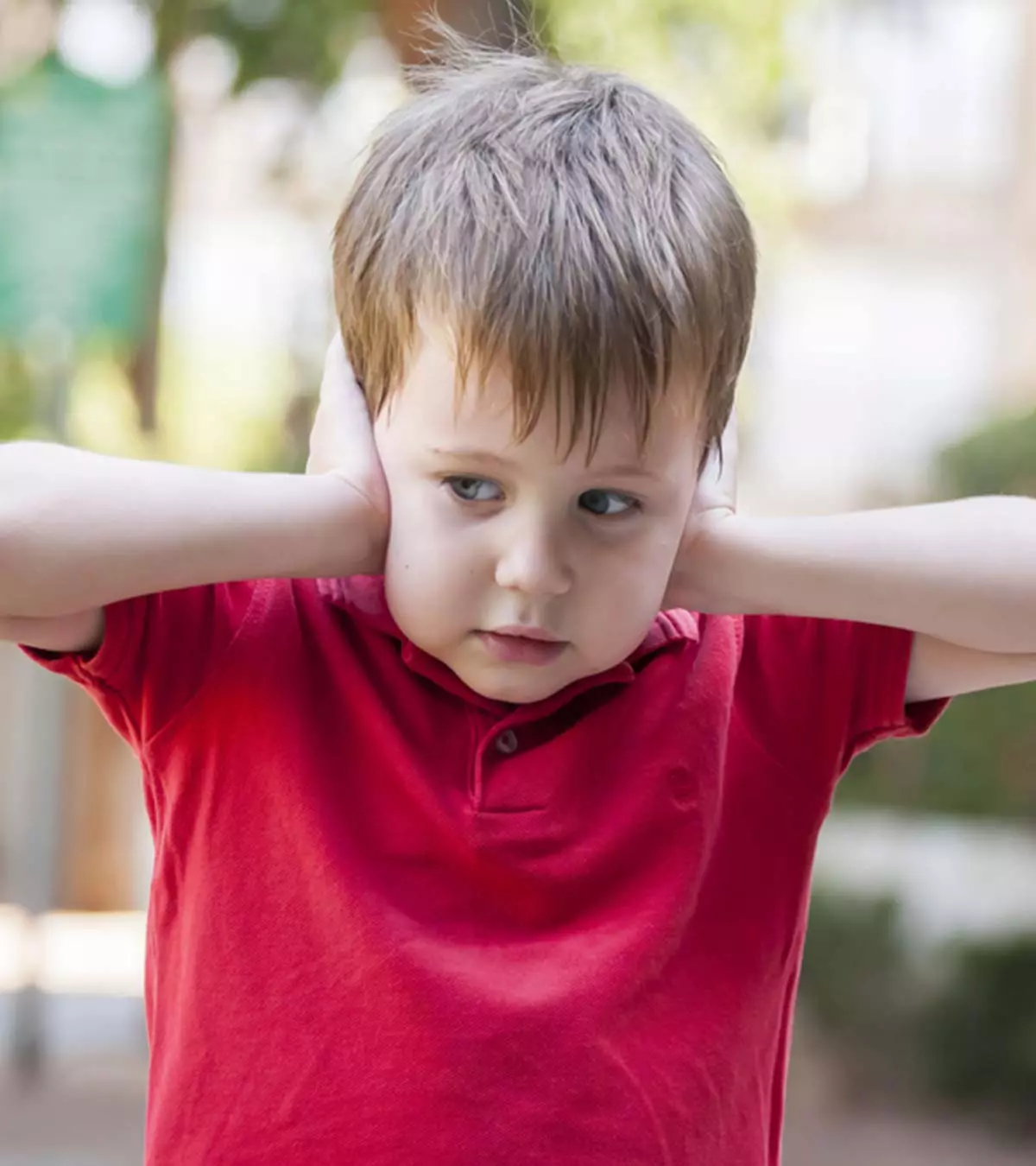
Image: Shutterstock
If you encounter moody children throwing tantrums and brooding in the corner, know that this is a common occurrence in children. Despite the common perception that only adults tend to have mood swings, child development experts suggest that being moodier is prevalent among children. Children, particularly young ones, are prone to becoming moody and gloomy; however, some children tend to have more mood swings than others.
This behavior in children may be attributed to their inability to express intense emotions, such as disappointment and dissatisfaction. While dealing with a moody child might be unpleasant, you have no choice but to manage your child’s behavioral problems (1).
In most situations, you can resolve the issues related to your child’s mood swings at home. However, in extreme cases, when you see that being moody and grumpy is becoming a part of your child’s personality, you may certainly bring it up with your doctor.
This post discusses some of the factors that can cause mood swings in children and how to deal with them.
Key Pointers
- Moody behavior and tantrums are common in children and are often associated with unexpressed issues.
- Some common reasons for mood swings in children include stress, lack of sleep, or other underlying issues.
- Spending quality time with children helps them feel safe and secure to express themselves and enhances their mood.
- Keeping a calm, friendly home atmosphere, encouraging positive behavior, and hearing a child out can alleviate their moody behaviors.
- Parents should also make sure that their children have a healthy diet, regular exercise, and enough sleep to support their physical and emotional well-being.
Parenting Moody Children
Here are discussed some basic principles that you need to keep in mind when it comes to parenting your moody child. These pointers will help you tackle the situation better. Take a look (2) (3).
1. Nurture Your Child

How you bring up your child makes a lot of difference.
No matter how busy you are, spending quality time with your child is essential. This will ensure that your child doesn’t experience communication difficulties with you.
Children feel secure with parental attention. Ideally, both the parents should spend quality time with him.
2. Allow Them To Express Himself
Your home should be the place where your child can express himself without any fear. Sometimes children get moody, as they do not know what to do. Children adopt passive behavior to showcase their displeasure.
SJ, a mom of three, observed her children’s bad moods and negative attitudes from six years of age. Sharing tips on handling moody children, she says, “Conversation (with my children) is an easy word for me to think about. I’m just going to facilitate a calm conversation about this (my children’s moodiness) at a calm time. There is no point for me in putting consequences on someone who is in a bad temper because to be given a consequence requires them to cooperate back (i).”
 Quick tip
Quick tip3. Encourage Positive Behavior
It is important that both of you, mother and father, sit together to come up with methods of expression for your child. You can bring the attention of your sulking child towards communicating the problem with their parents. Explaining issues will also sharpen their communication skills.
Let them know clearly that you or your partner will not respond to their negative behavior.
4. Stay Calm

Make sure you do not overreact when your child is being moody. Responding with patience and resilience will be more effective, as your extreme reaction may give them more power to show bad behavior.
The best thing you can do is let them express their dissatisfaction and validate, rather than ignoring them. Validation helps you and them, and you can suggest some solutions. Additionally, try practicing mindfulness together, like deep breathing or meditation, to help you and your child stay calm even when the conditions are stressful.
 Quick tip
Quick tip5. Keep Stress Level Low At Home
As a parent, you should keep stress at a minimum at home. Children get affected the most in stressful situations. When children experience stressful situations at home, such as a difficult family situation, their mental health can be affected, resulting in moodiness, anxiety, and depression.
According to the US Centers for Disease Control and Prevention (CDC), 9.4% of children between three and 17 years were diagnosed with anxiety, whereas 4.4% were diagnosed with depression during 2016-2019. These statistics reinforce the need to maintain a peaceful and calm environment at home. Remember, anger stresses children very easily. Ensure you avoid anger even when dealing with your moody child.
6. Ensure Proper Nutrition
You need to ensure your child is in proper health. It is better if you plan a balanced meal for them that includes all nutrients, instead of relying on supplements.
7. Schedule Time To Complain

Allot a special time just for complaining. Tell your young one that during this time, he can talk about things that bother him. If the time is over, ask him to continue with his complaint list the next day. When there is a complaining slot, your son will have to think of the things they want to complain about. The method, eventually, will reduce their habit of complaining and whining.
Frequently Asked Questions
1. Why is my child so moody?
Certain amounts of mood swings are common in growing children. However, if they display irritability most of the time, they might have a condition known as disruptive mood dysregulation disorder (DMDD). It indicates that these children cannot manage their emotions in an age-appropriate way (4). On the other hand, if children act sad and sullen and stop socializing or enjoying activities, it may indicate depression (5). Furthermore, boys are at a higher risk for developing behavioral disorders such as oppositional defiant disorder (ODD), characterized by frequent temper tantrums.
2. Is my child moody or bipolar?
Mood disorders can only be diagnosed by an expert in child psychology or a pediatric psychiatrist. Clinicians have different opinions about the possible existence of bipolar disorder in children due to overlapping symptoms with Attention-deficit/hyperactivity disorder (ADHD) and depression. Nevertheless, the symptoms of bipolar illness in children differ from those in adults. In children, mixed states of mania and depression and mood swings are more common than distinct episodes of each (as in adults) (6).
3. Is it normal for my 10-year-old to be moody?
Yes, it is normal for a 10-year-old to be moody sometimes. Puberty may start setting in at this age, triggering hormonal changes that may result in mood swings in children (7).
4. At what age can my child control their emotions?
Children start learning to manage their emotions between 3 to 5 years of age. Parents need to help their children learn self-control by validating their emotions and having realistic expectations (8).
5. How do I discipline a child who doesn’t care?
Some of the best ways to discipline an indifferent child are by clearly expressing your expectations, appreciating what they are doing correctly, telling them what they are doing wrong without being overly critical, and avoiding harsh punishment (9) (10).
6. Why is my child fussy all the time?
There can be several reasons why your child is fussy. Speak to your child to understand the underlying causes. You may also check for situations beyond the child’s control that may lead to fussiness. These include hunger, lack of sleep, illness, and concerns at home or school, causing stress in children.
7. What are the signs that my child’s moodiness is more than just typical behavior?
While occasional moodiness is normal in children’s development, potential red flags for a mood disorder include persistent changes in emotional intensity, duration, or frequency. Warning signs include withdrawal from previously enjoyed activities, noticeable changes in sleep or eating patterns, frequent unexplained physical complaints (like headaches or stomach pains), and a significant drop in academic performance (11). Pay particular attention if your child shows consistent difficulty managing family relationships, exhibits unexplained fatigue, or demonstrates behavioral changes lasting more than two weeks.
If you are panicking about your child’s moody behavior and tantrums, do know that your child is not the only one. Grumpy, gloomy, and bad mood is not exclusive to adults, and children may face similar problems related to emotional regulation. Difficult behavior or an unpredictable child temperament may also be an outcome of tiredness, hunger, sleepiness, or sickness. As parents, it may get difficult for you to deal with your moody children all the time. Some tips such as leading by example, encouraging them to use their words instead of actions, sticking to their schedule, feeding them high-calorie foods, etc., are some ways you can try to tackle your child’s mood swings.
Infographic: Does The Child Have A Mood Disorder?
Mood disorders in children can impact their academic performance and their ability to live a carefree and playful childhood. Although they typically have occasional mood shifts, mood disorders are more complex and require your attention. So use this infographic to spot the signs for timely intervention.
Some thing wrong with infographic shortcode. please verify shortcode syntax
Illustration: Helpful Tips For Dealing With Moody Children

Image: Stable Diffusion/MomJunction Design Team
Learn helpful advice on dealing with stubborn kids. Discover useful advice and techniques to manage challenging behaviors.
Personal Experience: Source
MomJunction articles include first-hand experiences to provide you with better insights through real-life narratives. Here are the sources of personal accounts referenced in this article.
i. 5 tips for dealing with moody children & negative attitudes.https://www.youtube.com/watch?feature=shared&v=RLo7ONDh04E
References
- Raising a Moody Child: How to Cope with Depression and Bipolar Disorder.
https://www.ncbi.nlm.nih.gov/pmc/articles/PMC2242638/ - Moody kids.
https://penfieldchildren.org/kohls-building-blocks/home-and-family/moody-kids/ - 8 Ways to Strengthen a Parent-Child Relationship.
https://www.familyservicesnew.org/news/8-ways-to-strengthen-a-parent-child-relationship/ - DMDD: Extreme Tantrums and Irritability.
https://childmind.org/article/dmdd-extreme-tantrums-irritability/ - Moody or Depressed?
https://www.parenting.org/article/Pages/moody-or-depressed-0.aspx - Pediatric Bipolar Disorder.
https://chadd.org/for-parents/pediatric-bipolar-disorder/ - Growth & Development: 6 to 12 Years (School Age).
https://choc.org/primary-care/ages-stages/6-to-12-years/ - Understanding the Stages of Emotional Development in Children.
https://www.rasmussen.edu/degrees/education/blog/stages-of-emotional-development/ - Discipline Shouldn’t be Punishing – for the Child or the Parent.
https://infoaboutkids.org/blog/discipline-shouldnt-be-punishing-for-the-child-or-the-parent/ - Discipline: Top Do’s and Don’ts When Your Kids Won’t Listen.
https://health.clevelandclinic.org/discipline-top-dos-and-donts-when-your-kids-wont-listen - Mood Disorders in Children and Adolescents.
https://www.chop.edu/conditions-diseases/mood-disorders-children-and-adolescents
Community Experiences
Join the conversation and become a part of our nurturing community! Share your stories, experiences, and insights to connect with fellow parents.
Read full bio of Dr. Sadhvi Mythili
Read full bio of Harshita Makvana
Read full bio of Swati Patwal
Read full bio of Apoorva K

















